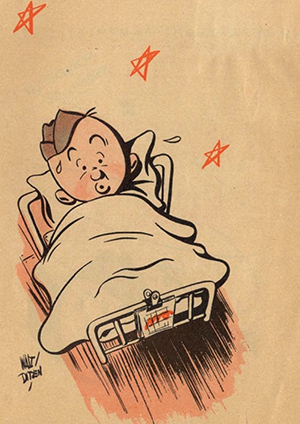Despite the fact that the United States military celebrated daring and risky behavior for the men when it benefitted the nation, it discouraged this masculine dimension in contexts that did not directly benefit the nation. The 1944 Army pamphlet, Pvt. Droop has Missed the War!, warns soldiers of the risky behavior they must avoid in order to remain a part of the US military.[^] Pvt. Droop, the protagonist of the pamphlet, is depicted as child-like, with a large head and a small, undeveloped body. The cover and first page show him looking disappointed and confused, with stars circling his head. The name “Droop” is also loaded, and signifies a lacking virility and physical presence.[^]

Pvt. Droop Has Missed the War!, p. 1. (Historic Government Publications - Southern Methodist University)
The pamphlet opens with Pvt. Droop in a hospital bed, with the text, “When he gets out, he won’t be Pvt. Droop any more. He’ll be Mr. Droop - the army can’t use a man with a permanently wrecked leg.”[^] The statement is unfriendly toward his current status, and is condemning of his military status following his injury. The pamphlet goes on to say, “Did he fall on the field of battle on some far-off front? Was he trying to save a buddy under raking machine-gun fire? Nope! Pvt. Droop was hit by a truck while he was crossing a street in the middle of the block.”[^] The passages shame him for being hurt off the field of battle, and honor the ways in which soldiers could end up disabled in battle. They further shame him by adding, “He has missed the war – the war he wanted to fight. He has deserted, not from lack of patriotism, but from thought-lessness.”[^] The deserter label is a very serious charge; it came with a very negative connotation and pulled in notions of cowardice and willful abandonment of his nation.
Following this example of failure and emasculation, the pamphlet goes on to warn soldiers of activities that could potentially be dangerous, ranging from drinking and driving to attending “firetrap roadhouses and cabarets” and driving with one hand.[^] On several occasions, the pamphlet uses the word “droop” as a negative description of people who are acting unintelligently or overly risky. This pamphlet shows the ways in which the military took notions of manhood and twisted them to encourage behavior that benefitted them. Men were encouraged to engage in dangerous behavior when it benefitted the military, but expressly avoid it when it could potentially harm the military’s ultimate goals.
Related Sections
- Adventurousness & Aggressiveness
- Adventurousness & Aggressiveness - A'feudin' and A'fightin'
- Adventurousness & Aggressiveness - Defend Your Country
- Adventurousness & Aggressiveness - Flight Into Fury
- Adventurousness & Aggressiveness - Li’l Abner Joins the Navy!
- Adventurousness & Aggressiveness - Palau
- Adventurousness & Aggressiveness - Saipan
- Adventurousness & Aggressiveness - Tarawa
- Adventurousness & Aggressiveness - The Fighting Redhead
- Adventurousness & Aggressiveness - Vanguard of Doom
- Antifemininity - Pvt. Droop Has Missed the War!
Primary Sources


